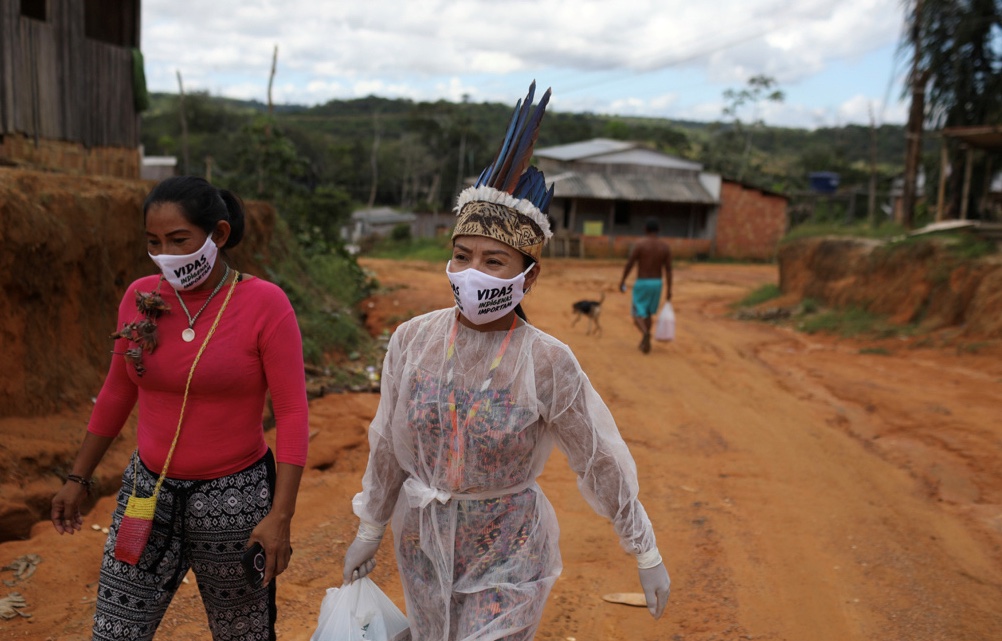Discerning, sceptical, and relatively well informed: news audiences in the 'infodemic'

A volunteer nurse protects her indigenous community of 700 families from the COVID-19 outbreak ravaging the Brazilian city of Manaus. / REUTERS/Bruno Kelly
This piece is a lightly edited version of Rasmus's keynote speech at Global Fact 7, this year's global fact-checking conference. You can watch the speech here.
The coronavirus pandemic is a communications crisis in addition to being a medical emergency:
- Each of us face the risk and uncertainty that comes with a new, and still poorly understood disease.
- Each of us face the risk and uncertainty that comes with interpreting and responding to how our governments, and other powerful institutions respond to it.
- And each of us face the risk and uncertainty that comes with the question of what each of us will do – do to protect ourselves, to protect our loved ones, and to protect our communities.
We cannot and must not deal with all this risk and uncertainty only on the basis of our own personal experience and what we think we know.
We have to rely on others – perhaps on public health experts, on politicians, on public authorities, on platform companies, and on publishers, all of whom who can help us understand the pandemic, judge our governments’ responses, and respond ourselves.
There is great power in this. We, collectively, know more about the pandemic than any one of us. And only we, collectively, will be capable of minimizing its death toll and handling the wider economic, political, and social impact. None of us can do this alone.
There is also a great vulnerability in this. Every time we trust someone else, we take a risk. What if they are not to be trusted? What if they meant well, but got it wrong? What if their motives were mixed and the results uneven? What if we misunderstood them? What if they were making shit up or deliberately trying to mislead us?
And here is where we arrive at the coronavirus communications crisis. Much of the news and information we are presented with about the pandemic is at best imperfect, it is often ambiguous, and some of it is misleading or outright false. And there is a lot of it, and an eager appetite for some of it as people try to understand and respond to the situation.
This is the situation that the WHO describes as an “infodemic”, a kind of tsunami of information that also includes misinformation and rumours.
(I think it is worth noting here as an aside that while there is a large and vibrant international community of media and communications research, including important subfields like health communication, risk communication, and science communication, the term “infodemic”, while evocative, is not one that has been used much in scientific research before 2020.)
How do people navigate the “infodemic”?
So how do people navigate this “infodemic”? Who do they rely on to guide them through the communications crisis that is accompanying the pandemic? How well is it working in terms of how much they know about the disease? And what sources and what platforms are they most concerned about as possible conduits for potentially false or misleading information?
These are big, important, urgent questions.
As a scientist, maybe I should answer “we don’t know” to all of them and return to my desk.
That would be true. It would be safe. I also think it would be a dereliction of duty.
If scientists are not willing to put themselves on the line and do their honest best of trying to make sense of big, important, urgent questions, how can we expect journalists, policymakers, or the public to rely at least in part on our work as they address them? How can we expect them to see the value of scientific work?
“Give me two years and I’ll let you know” is not a good answer in a global crisis.
Science has its own imperfections, scientists their own selfish motivations, and rushed and sloppy work may be more dangerous here than in other line of work, but I would suggest that every solid, evidence-based study we can bring to bear on our problems now is worth dozens of more sophisticated studies coming out years from now in fancy journals.
And I am proud to see many different researchers step up around the world, researchers who are helping the public, helping journalists, helping policymakers, and helping many others understand and react to the crisis in all its many different forms.
Let me share a few empirical insights specifically from our own work at the Reuters Institute for the Study of Journalism as we have tried to step up.
Like all research science, this is uncertain and subject to revision as we collect more data and the situation evolves, and the findings will not necessarily apply in every country or every context, but we hope it is useful in understanding how people are navigating the infodemic.
The underlying premises of our work in this area are:
- First, that we need to understand information and misinformation together in the wider context of media and information use and with constant attention to how political beliefs and social identities influence how people engage with and use information.
- Second, while it is important to identify misinformation and different types, sources, and claims of misinformation, and the sources and platforms that spread misinformation, we should be at least equally attentive to outcomes, whether people are in fact misinformed.
- Third, all information and misinformation is also relational, social facts that transcend their truth value and meaning for each of us as individuals and social facts that, well beyond the cases where professional fact-checkers or others can determine the veracity of individual claims, and beyond even the much, much wider universe of often highly consequential and political expression that actually make no specific statements of fact, problems of misinformation are at least in part about what people think is misinformation, and where they fear it comes from. If, for example, people think independent news media and professional journalists produce “fake news”, they probably won’t read it, trust it, and engage with it.
Sources and platforms people rely on
What sources do people rely on for news and information on coronavirus? When we surveyed nationally representative samples of internet users across six countries in early April, the findings were clear in one sense, but also complex.
Clear, in that news organizations are very central. Across the six countries we cover, Argentina, Germany, South Korea, Spain, the UK, and the US, about two-thirds say they have relied on news organizations, ranging from a low 47% in Germany to a high 77% in South Korea.
Complex, in that news organizations are far from alone. Not only do between half and a quarter of our respondents say they have not used news as a source of information about the coronavirus in the past week.
There are also other sources that are widely named – especially governments, health authorities, and scientists, presumably often accessed via news media. And of course many say they rely on platforms including search, social media, video-sharing sites, and messaging apps to access news and information about the coronavirus, just as they rely on these platforms for much else,
People don’t trust all these sources and platforms equally. We have documented a significant “trust gap” between relatively high levels of trust in news media at least in April, and much lower trust in search and especially social media, video-sharing sites, and messaging applications.
Nor does an early “rally around the flag” always last. At least in the UK, where we have surveyed regularly since, the initial upsurge in trust in established institutions has been followed by non-stop decline in trust, in news media, and especially in government, just as news avoidance has increased. But these are the sources and platforms that people rely on.
Do these sources and platforms help people stay informed?
What significant associations can we find between using these different sources and platforms for information, and how much people actually know about coronavirus as a disease?
As said from the outset, there is great power in relying on others. They can make us more knowledgeable, more capable. But there is also great vulnerability. Trusting those who are not trustworthy might leave us misinformed!
We have plenty of reason to worry about this. Some individual politicians have lied and misled the public about the coronavirus and their response. Some governments try to deny that the disease even exists. News media now under heightened scrutiny for their often poor record of covering police violence and racism also sometimes get the facts wrong. And of course, we have copious evidence of the widespread problems of false and misleading information shared, spread, and sometimes amplified via various platforms.
To try to understand how these very real misinformation problems influence how informed people are, in our survey research we have asked people a series of factual questions about the coronavirus, most of them drawn from the WHO’s official coronavirus 'myth buster' site.
For each statement, we ask respondents whether it is true, false, with an option to answer “don’t know”. The number of correct answers people give to these factual questions provide a narrow but useful indication of how much they know about the coronavirus.
The most important takeaway here may be that most people do relatively well, with a clear majority answering most of the questions correctly, and many of those who do not answer correctly are simply unsure. Perhaps most people are relatively informed and resilient enough to be exposed to at least some misinformation from politicians and via platforms and still not be misinformed.
Social factors like education matter, with slightly lower levels of knowledge among those with limited formal education. Political factors matter too, with those sympathetic to politicians who have advanced false or misleading claims about coronavirus often less informed.
Controlling for these social and political factors, as well as demographic factors, we have two further findings I want to highlight.
The first is that in most of the countries we have studied, there is a clear, positive, and significant association between using news organizations as a source of information about coronavirus and knowing more about the disease.
It may sound like I am preaching to the choir when I tell you that news helps make people more informed, but I am just reporting an empirical finding.
The second is that we find no similar consistent significant association – neither positive, nor negative – between relying on platforms and how informed people are. In a few countries, there are negative associations for some platforms, specifically video-sharing sites and messaging apps. In a few countries, there are positive associations for one, search. For social media, we find no positive or negative association in any of the six countries covered.
Thinking about misinformation problems
How does the public think about these issues? Across the six countries we surveyed, large majorities say that they find that news media has helped them understand the pandemic and helped explain what they can do in response to the pandemic. A large minority do not use news media, do not trust news media, and do not think news media helps them. But most do.
However, this is complicated stuff, and I want to stress that surveys do not necessarily give a robust view of whether people are in fact exposed to misinformation. However, as said, misinformation is a social fact too, and it is important in itself to understand how people understand it. We try to do this by asking people about both sources they might see false or misleading information from and platforms they might see false or misleading information on.
If we look at the sources people say they see “a lot” or “a great deal” of misinformation from, concern varies from country to country, but generally focus on three types of sources: ordinary people I don’t know, politicians, and, in some countries, news media.
If we look at platforms, concern is focused on social media.
And in every case, across both sources and platforms, it is a minority who say they see a lot or a great deal of false or misleading information.
This is just a snapshot, and as with trust, in a high-stakes and tumultuous situation, things can change quickly – in the UK, where we have followed the crisis closely, just as trust in government has declined sharply, the number of people who say they are concerned about false or misleading information about coronavirus from the UK government and from politicians has grown dramatically.
So, in summary – people rely on news media, but also politicians and platforms, for news and information about coronavirus, they often don’t trust the sources and platforms they rely on, and there are widespread concern over potentially false and misleading information, especially from strangers and arguably most importantly from politicians and via social media, but overall, the only source or platform of information we find consistently associated with how much people know about the coronavirus as a disease is news – which demonstrably help people be more informed.
Where do we go from here?
I think there are different takeaways for different actors, as well as the broader takeaway that no one can lift this on their own, and we may need to collaborate even as we often should also compete with and criticize one another.
For researchers like myself, I hope we will see more genuinely international work on how these issues are playing out in different parts of the world, in addition to more attention to sources and platforms of misinformation as well as outcomes – are people in fact misinformed? – to supplement ongoing work on the basic fact that, well, there is a lot of misinformation out there.
For journalists, our findings are in part encouraging – people turn to you in a crisis, they trust you more than many other institutions, at least in this situation, and they demonstrably benefit from your work – but also perhaps challenging. Even in an unprecedented crisis, and an age of abundant supply and easy access, between a quarter and half of our respondents say they haven’t relied on news for information about coronavirus in the last week. It is clear we are not reaching the whole public, and not serving all communities well.
For platforms, this is yet another reminder that despite the steady stream of announcements and initiatives, there is much more to be done (and perhaps reasons to note that people are often sceptical of the governments that many platforms increasingly collaborate with). These for-profit and sometimes closed environments remain, to different degrees, opaque, inconsistent in enforcing their own standards, and it is unnecessarily and dangerously hard for independent third parties to understand what is going on, and respond to problems where they are identified. I don’t see how this can go on indefinitely.
For politicians, our research suggests that the whole political class and sometimes even our governments themselves are seen as central to misinformation problems by much of the public. Prominent politicians often set the news agenda, they take collectively binding decisions, and they influence their most loyal supporters’ attitudes and behaviour. With this great power comes great responsibility. Some politicians are clearly more interested in the power part of this than the responsibility part, and it is perhaps worth noting here that beyond coronavirus, much of what is arguably the most consequential misinformation in my lifetime has come from elected officials, whether during the run-up to the Iraq war or around climate change, just as we are reminded every day in the United States right now that public authorities like the police also sometimes lie and mislead.
For the public, while some pundits seem to think most people are naïve idiots, easily fooled and misled, our research provides little support for this condescending assumption. We are all naïve some of the time, we are all, occasionally, idiots. But I can find no convincing evidence that most people are naïve idiots most of the time. In fact, most people come across in our research as pretty discerning, rather sceptical, and relatively well informed, even as they are also very different, disagree vigorously, and many hold political views – or support politicians – that others find abhorrent.
We should not confuse the latter part of this, the irreducible diversity and deep conflicts that characterize free societies, with problems of epistemology and information. If we try to solve for disagreement, even incredibly disturbing, offensive, and shocking forms of disagreement that concern who we are and how we live together, we are working against the crooked timber of humanity and the fundamental realities of value pluralism and deep, even existential, disagreement as part and parcel of politics.
If people are in fact relatively informed, despite all the very real problems we face, perhaps, we should see that as a kind of success? And remember that no member of the public gets there on his or her own.
They get there in part by taking a risk and relying on independent professional journalists, fact-checkers, and perhaps occasionally researchers – and we have to show them every day that they are right to trust us. As I know all of you strive to do.
References to underlying Reuters Institute's research
- Brennen, J. S., Simon, F., Howard, P. N., Nielsen, R. N. 2020. Types, Sources, and Claims of COVID-19 Misinformation. Oxford: Reuters Institute for the Study of Journalism.
- Fletcher, R., Kalogeropoulos, A., Nielsen, R. K. 2020. Trust in UK Government and News Media COVID-19 Information Down, Concerns over Misinformation from Government and Politicians Up. Oxford: Reuters Institute for the Study of Journalism.
- Kalogeropoulos, A., Fletcher, R., Nielsen, R. K. 2020. Initial Surge in News Use Around Coronavirus in the UK Has Been Followed By Significant Increase In News Avoidance. Oxford: Reuters Institute for the Study of Journalism.
- Nielsen, Rasmus Kleis, Richard Fletcher, Nic Newman, J. Scott Brennen, and Philip N. Howard. 2020. Navigating the ‘Infodemic’: How People in Six Countries Access and Rate News and Information about Coronavirus. Oxford: Reuters Institute for the Study of Journalism.
- Nielsen, Rasmus Kleis, and Lucas Graves. 2017. “‘News You Don’t Believe’: Audience Perspectives on Fake News.” Oxford: Reuters Institute for the Study of Journalism.







